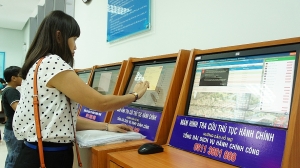Task is tough to realise business environment goals
 |
| Task is tough to realise business environment goals, illustration photo/ Source: freepik.com |
More than a week ago, at a conference on implementation of Resolution No.02/NQ-CP on improving the business environment and enhancing national competitiveness, the Ministry of Planning and Investment (MPI) was listening to the voices and concerns of businesses and associations.
“If more than three businesses or associations claim the same issue, we consider it as an issue to study and amend soon to remove challenges for them,” Tran Duy Dong, Deputy Minister of Planning and Investment said after listening to dozens of comments on numerous issues that businesses are struggling with.
Resolution 02 is launched in early January every year. However, many problems voiced for some time have not been tackled yet. More seriously, during the process of amending inadequate regulations, newly released or redrafted rules add even more new problems.
“For instance, Decree No.10/2020/ND-CP asks that passenger transport companies must send the content of their contract to the department of transport of the locality via email before each journey. With hundreds of trips starting each day, this costs these companies a large amount of money, whereas the management unit has to receive a huge quantity of emails per day to process,” said Dau Anh Tuan, deputy general secretary of the Vietnam Chamber of Commerce and Industry (VCCI).
Another issue comes from the Law on E-Transaction 2023, effective as of July 2024, which stipulates that a ‘trust service’ is a conditional business line whose operations include the provision of ‘electronic data authentication services’, licensed by the Ministry of Information and Communications.
However, according to Decree No.52/2013/ND-CP, the service of ‘electronic contract authentication in commerce’ is licensed by the Ministry of Industry and Trade. This seems to imply that a trust service must register for two licences from two ministries.
Yet another inadequacy lies in an issue that has existed for seven years already. As stipulated in Decree No.09/2016/ND-CP by the government, iodine must be added to the salt for cooking and food processing, while wheat flour for food processing must include iron and zinc.
“This goes against the principles of risk management and is not in compliance with the recommendations of the World Health Organization, possibly leading to harmful influences on consumer health,” Tuan said.
The government has already released Resolution No.19/2018/NQ-CP, asking for the amendment of this regulation, yet until now, there is no decree for this, Tuan added.
“Obviously, the introduction of proper policies is a necessary condition to provide a better business environment, but it is the improvement in the capability to carry out those policies effectively that truly forms a friendly and favourable environment for enterprises,” Tuan said.
The General Statistics Office revealed that in the first two months of 2024, Vietnam had 41,100 newly registered or reactivated businesses, a rise of 8.5 per cent compared to this time last year. However, the number of companies permanently stopping their operation was 63,000, an increase of 22.5 per cent on-year.
This has attracted the attention of the government to improve the business environment for a brighter economic picture. It has launched several activities and introduced various resolutions and directions on the matter.
According to experts, there are some reasons for delays in handling business recommendations, including a huge amount of work, with high requirements and tight deadlines, under intense pressure from both above and below. This requires all parties, including state management agencies, businesses, and associations, to be more responsible with recommendations and proposals.
“I remember the first seminars with the tax and customs industry were very tense with many conflicting views between management agencies and businesses, but since then, some surveys on taxpayer satisfaction that were conducted by the VCCI have been used by the General Department of Taxation as data for public service inspection. After 10 years, the tax and customs sectors have been recognised as having the most improvement,” Tuan of the VCCI explained.
Ministries are now reviewing and simplifying business regulations following Resolution No.68/NQ-CP, issued in 2020. Meanwhile, the prime minister’s task force to review legal documents is carrying out its annual mission to adjust any inadequate regulations.
During 2021-2023, it was able to simplify nearly 2,500 business regulations. The prime minister has also approved proposals to simplify more than 1,100 more business regulations.
According to the Central Institute of Economic Management, on international rankings, market development has been improving significantly, from 147th in 2017 to 59th in 2024, and ranked 11th among 39 economies in Asia-Pacific.
The sustainable development index has increased continuously, ranked 55th in 2022. The global innovation index in 2023 was ranked 46th, improving two places compared to 2022.
According to targets stated in Resolution 02, in 2024 market entry (new formations and resumptions) will grow by at least 10 per cent from 2023, while corporate bankruptcies will rise by less than 10 per cent.
Vietnam will rise in the IT Infrastructure Index by at least three places in the rankings, the Environmental Quality Index by at least 10 places, the ICT Services Export Index by at least five places, the Priority Index for tourism and travel by at least five levels, and the Tourism Service Infrastructure Index by at least three spots.
To accomplish these goals, all levels, sectors, and localities must overcome difficulties and boost their innovation and reforms in the spirit of “disciplined responsibility, timely actions, accelerated creativity, and sustainable efficiency,” the resolution states.
In addition, Resolution 02 underlines several key solutions to removing legal inadequacies in investment; as well as invigorating IT applications, communication, and data sharing among state agencies to improve administrative procedures.
Furthermore, the resolution will enhance access and absorption of capital for businesses, stimulating companies to invest and manufacture towards sustainable development. The government also requires leaders of central and local agencies as well as the VCCI to promptly capture and coordinate with each other to immediately resolve difficulties for businesses.
“Resolution 02 is expected to revive the spirit of reforming the business environment and sharpening national competitiveness to complete socioeconomic development plans and state budget estimates in 2024,” said Dong from the MPI. “These solutions aim to clear bottlenecks in the economy because strong reforms and improvements in the business environment are what the business community need the most.”
| Ly Kim Chi, chairwoman Food and Foodstuff Association Ho Chi Minh City
Over recent years, numerous large enterprises in the food industry have transferred and cooperated with foreign enterprises and funds. For key commodities that can affect national food security, this situation is not great. Without a consistent legal policy from the government to support domestic businesses to reduce pressure and go ahead, the domestic food industry will further narrow as the transfer and cooperation trend increases in the near future. It is time to change the way we conduct reforms, by adding monitoring mechanisms to those who carry out institutional reforms, improving the national business environment to create breakthrough results. Currently, there are still many inadequate regulations that have a great impact on businesses. Although the government has been directing to remove these obstacles over many years, they still persist and have not been completely resolved. One of the regulations that has the longest and most severe impact on food businesses, is the problem in Decree No.09/2016/ND-CP on fortifying micronutrients in food. This inadequacy has persisted for nearly seven years, and enterprises in the food industry have been enduring many difficulties and losses every day from the requirement that all enterprises must add iodine to salt and add iron and zinc to flour in food processing. This requirement goes against the principles of risk management, not in accordance with the recommendations of the World Health Organization, is ineffective and not internationally consistent We have continuously proposed amendments to the government and the Ministry of Health. Delaying and prolonging certain changes has caused countless losses, not only in terms of money and time, but also in export markets, and the competitiveness of the industry. This is affecting business confidence in the government’s policies and management effectiveness. Pham Xuan Hoe, general secretary Vietnam Financial Leasing Association
In Circular No.24/2023/TT-BCA on procedures for issuance and revocation of vehicle registration and licence plates, motor vehicle registration must be registered in the address of the headquarters of the financial leasing companies, and most of them are all headquartered in Hanoi and Ho Chi Minh City. This causes a host of issues. The problem is that customers have to move numerous vehicles from various localities to these two big cities, raising costs, and waiting times of 3-5 working days. Vehicle licence plate fees in the two big cities is around $840 per vehicle and the registration fee in the two biggest cities is 12 per cent of the vehicle’s value, instead of 10 per cent in other provinces. Issuing and re-issuing licence plates of old vehicles under financial leasing registered in the provinces is too confusing. When changing the engine block, the registration content changes, and financial leasing companies do not know how to re-register in a province or move to Hanoi or Ho Chi Minh City. It takes more than a month to carry out this procedure. Without the licence plate, the vehicle cannot be used and cannot help businesses or individuals earn money. Because the vehicle licence plate is registered according to the headquarters of financial leasing companies in the two main cities, our customers mostly run in other cities and provinces but do not receive fee exemptions or reductions when using roads and bridges. Meanwhile, vehicles of financial leasing customers operating in the area are eligible for exemptions. This causes many disadvantages and inequities for vehicles with financial leasing. Preliminary statistics from four member companies strongly suggest that these problems greatly affect their financial leasing activities. Specifically, over 70 financial leasing contracts have already been cancelled by customers. The total amount of money signed in the contract but unable to be disbursed by the member companies is $18 million. |
 | Simplifying administrative procedures for economic growth In the context of the pandemic, reforming administrative procedures is necessary to encourage businesses to approach the market and contribute to economic growth. |
 | PM urges streamlining administrative procedures, paving way for transport projects Prime Minister Pham Minh Chinh asked ministries, agencies and localities to work harder in order to pave way for transport projects, saying administrative procedures should be streamlined, while concluding a meeting of the State steering committee for national key transport projects in Hanoi on April 12. |
 | Hanoi to make clear administrative procedures in environment area The Hanoi Department of Natural Resources and Environment will hold a dialogue with organisations and individuals on the administrative procedures in the field of environment in July, according to director of the department Nguyen Huy Cuong. |
 | Basic administrative procedures in education turned online A database of over 24 million teachers and students, accounting for 98 per cent of the total, has been verified and linked to the national population database, making the Ministry of Education and Training (MoET) among the first agencies to complete the database connection, said director of the ministry's Information and Communication Technology Department Nguyen Son Hai. |
What the stars mean:
★ Poor ★ ★ Promising ★★★ Good ★★★★ Very good ★★★★★ Exceptional
Related Contents
Latest News
More News
- Masan Consumer names new deputy CEO to drive foods and beverages growth (February 23, 2026 | 20:52)
- Myriad risks ahead, but ones Vietnam can confront (February 20, 2026 | 15:02)
- Vietnam making the leap into AI and semiconductors (February 20, 2026 | 09:37)
- Funding must be activated for semiconductor success (February 20, 2026 | 09:20)
- Resilience as new benchmark for smarter infrastructure (February 19, 2026 | 20:35)
- A golden time to shine within ASEAN (February 19, 2026 | 20:22)
- Vietnam’s pivotal year for advancing sustainability (February 19, 2026 | 08:44)
- Strengthening the core role of industry and trade (February 19, 2026 | 08:35)
- Future orientations for healthcare improvements (February 19, 2026 | 08:29)
- Infrastructure orientations suitable for a new chapter (February 19, 2026 | 08:15)



 Tag:
Tag:



















 Mobile Version
Mobile Version